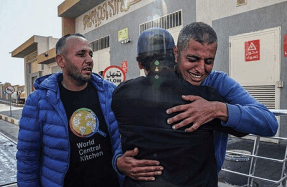Inside the Conflict Zone

Donald Trump hasn’t been sworn in yet, but he is already making decisions and issuing statements to world leaders that radically depart from American foreign policy, all to the benefit of his family’s corporate empire. Because of this, the next president of the United States is already vulnerable to undue influence by other nations, including through bribery and even blackmail.
Given the vast scope of the clashes between the Trumps’ extensive business dealings and the interests of America, the president-elect vowed during the campaign to eliminate potential conflicts by severing ties to his company—yet, with only weeks to go until he takes the oath of office, he hasn’t laid out a credible plan. Trump’s sole suggestion to date—a “blind trust” run by his children—would not eliminate the conflicts, given that the money generated would still go to his family. Moreover, such a trust would be anything but blind: If Trump Tower Moscow goes under construction, Trump will see it while in Russia and know that his kids are making millions of dollars from it. That is why foreign leaders hoping to curry favor will do everything they can to help Trump’s family erect more buildings, sell more jewelry and make money through any means possible. Even if the family steps away from its company while Trump is president, every nation on Earth will know that doing business with the Trump Organization will one day benefit the family. The only way to eliminate the conflicts—sell the company, divvy up the proceeds—has been rejected by Trump, whose transition team refused to respond to any questions from Newsweek for this article.
Some of the most egregious conflicts that have emerged involve countries in Asia and its subregions, particularly the Philippines. Global policy on the Philippines has been fraught with tension since the election in May of Rodrigo Duterte as the country’s president. Duterte, who boasted to voters during the campaign that he had shot a fellow law school student for teasing him, has championed the killing of suspected criminals and street children by vigilante death squads. In 2015, he said that if he became president, up to 100,000 people suspected of links to illegal drugs could be killed. Just months after his election, Duterte said he was eager to lead a genocide of up to 3 million drug addicts. “I'd be happy to slaughter them,” he said. “At least if Germany had Hitler, the Philippines would have [me].” And in September, an admitted hit man testified to a Senate committee in the Philippines that Duterte presided over a killing campaign when he was mayor of Davao City.
You’re reading a preview, subscribe to read more.
Start your free 30 days





